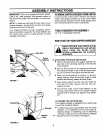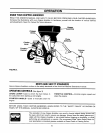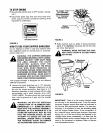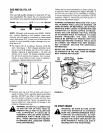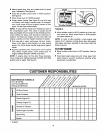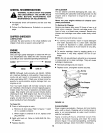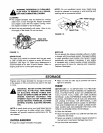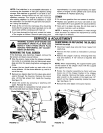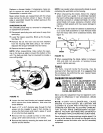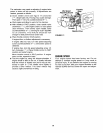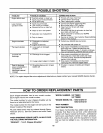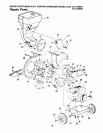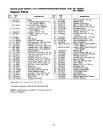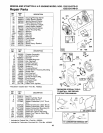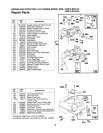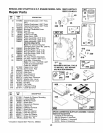
Replace or sharpen blades. If sharpening, make cer-
tain to remove an equal amount from each blade.
Reassemble in reverse order.
Make certain blades are reassembled with the sharp
edge facing the direction shown in figure 19 (sharp
edge is assembled toward the slotted opening in the
impeller assembly).
SHREDDING BLADE
The shredding blade may be removed for sharpening
or replacement as follows.
• Disconnect spark plug wire and move it away from
spark plug.
• Lower the hopper assembly. Block up the housing.
See figure 15.
• Remove the six hex lock nuts and lock washers
from the housing weld bolts using a 1/2" wrench.
Separate the chipper-shredder into two halves.
• Remove the back-up plate.
NOTE: When reassembling, make certain the open-
ing on the back-up plate is toward the bottom of the
unit. The back-up plate may be reversed to provide a
new cutting edge.
Allen
Screws
Pil
Sharp Edge
FIGURE 15.
Torque
Wrench
• Loosen the two hand knobs and cupped washers
which secure the chute deflector, and raise the
chute deflector.
• Insert a 1/2" or 3/4" diameter pipe through the flail
screen into the impeller to keep it from turning, or
remove the flail screen and insert a piece of wood
(2 x 4) into the chute opening.
• Remove the two outside screws on the blade,
using a 3/16" allen wrench and a 1/2" wrench.
• Remove the blade by removing the center bolt, lock
washer and flat washer.
13
NOTE: Use caution when removing the blade to avoid
contacting the weld bolts on the housing.
• When sharpening the blade, follow the original
angle of grind as a guide. It is extremely important
that each cutting edge receives an equal amount of
grinding to prevent an unbalanced blade. An unbal-
anced blade will cause excessive vibration when
rotating at high speeds and may cause damage to
the unit.
The blade can be tested for balance by balancing it
on a round shaft screwdriver or nail. Remove metal
from the heavy side until it is balanced evenly. See
figure 16.
Bl!de '__
!
FIGURE 16.
• When reassembling the blade, tighten to between
550 and 650 inch pounds, or lacking torque
wrench, tighten securely.
FLAILS
The flails, located inside the housing, may be
reversed when they become dull. It is suggested that
this procedure be performed by your nearest Sears
Service Department.
CARBURETORADJUSTMENT
WARNING: IF ANY ADJUSTMENTS ARE
MADE TO THE ENGINE WHILE THE
ENGINE IS RUNNING (E.G. CARBURE-
TOR), KEEP CLEAR OF ALL MOVING
PARTS. BE CAREFUL OF HEATED SUR-
FACES AND MUFFLER.
Minor carburetor adjustment may be required to com-
pensate for differences in fuel, temperature, altitude
or load.
NOTE: A DIRTY AIR CLEANER WILL CAUSE
ENGINE TO RUN ROUGH. BE CERTAIN AIR
CLEANER IS CLEAN AND ATTACHED TO THE
CARBURETOR BEFORE ADJUSTING CARBURE-
TOR. DO NOT MAKE UNNECESSARY ADJUST-
MENTS. FACTORY SETTINGS ARE SATISFACTO-
RY FOR MOST APPLICATIONS AND CONDITIONS.
Never attempt to change maximum engine speed. It is
pre-set at the factory and should be changed only by
a qualified service technician who has the necessary
equipment.



